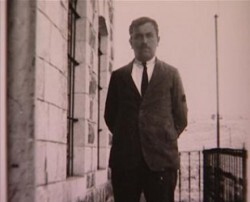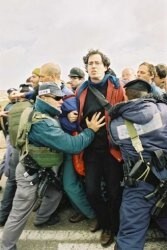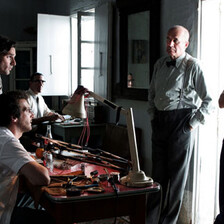The Electronic Intifada 19 July 2005
Two new Israeli films that premiered at this month’s Jerusalem Film Festival explore the moral failure that is inherent in Zionism. In the biographical documentary The Diaries of Yossef Nachmany, the Zionist leader largely responsible for the Judaization of the Galilee in the years leading up to the State of Israel is portrayed as conflicted by the ultimate consequence of Zionism — the expulsion and suffering of the indigenous Palestinian population. And in the important documentary Dear Father, Quiet, We’re Shooting … , we see that the Zionist enterprise is spiralling so far out of control that Israeli citizens are being made to collectively pay for the ideology of the extreme minority. This was most keenly felt during Israel’s twenty-year war with Lebanon during which hundreds of Israelis, and tens of thousands more Palestinians and Lebanese, perished — meriting the war the epithet “Israel’s Vietnam” and eliciting protests amongst Israelis that this is “not our war.”
The Diaries of Yossef Nachmany

Yossef Nachmany
Settling in the then-mixed city of Tiberias in 1921, Nachmany rose to be a leading figure with the Jewish National Fund, which was acquiring the land that would eventually help Zionism win the ultimate prize — a Jewish state. He is credited with acquiring much of the land that enabled the Haganah military’s eventual victory in the north. However, Nachmany’s Zionism-with-a-conscience idyll that he so prided himself on evaporated with the Arab uprising in 1936, when he became cut off from his Arab collaborators (many of whom were assassinated when others caught wind of what was going on). Eventually Nachmany himself became a wanted man.
But Nachmany still didn’t realize that he couldn’t have his cake and feel guilt-free too. In a 1939 diary, he penned his frustration with the protesting Arabs “who didn’t see the benefits of our efforts” — whatever those may have been. He delusionally absolved himself of personal responsibility when he wrote, “I must succeed,” because he believed that the mission of Zionism was far greater than himself or his conscience.
While the film’s rapid-pace narration never describes these “Arabs” as the Palestinians they are — or gives their nationalism any space as well — the film is significant for illustrating the Haganah (the Jewish militia that was the precursor to the Israeli Defense Forces) in stark contrast to its heroic and just Zionist narrative. Much to Nachmany’s horror, the Haganah coldly shot Arabs, massacred villages, raped women, and extinguished any possibility for the co-existence Nachmany so loftily dreamt of. The massacre at Deir Yassin made Nachmany particularly “sick,” because this tide-turning event meant that “no one will ever trust us to protect Arab rights in this country.”
Of course, expropriating a people’s land and disallowing them from returning is already a rights violation. (Though Nachmany originally thought that the Arabs should be able to return to Tiberias, he was the one to suggest that its old city be burned and developed, precluding them from doing so.) Nachmany ultimately failed in his original plan to legally acquire the land while maintaining the presence of the Arabs he thought gave it authenticity.
As Zionism gained its legs, Nachmany’s moderate methods became irrelevant. In the words of his less than moderate son, “Why should we buy [the land] when we can get it for free?” This latter Zionism is what became the State of Israel, and still perpetuates the settlement construction, and thus protracted conflict, in the West Bank (including East Jerusalem) and the Gaza Strip. And this moral rift is brought to the forefront in Dear Father, Quiet, We’re Shooting … .
Dear Father, Quiet, We’re Shooting …

A film still from Dear Father, Quiet, We’re Shooting …
The most compelling of the refuseniks is Lt. Col. Yoel Peterberg, who left the old-boy’s club of the elite Israeli Air Force when he realized that the whole time he was working to “defend” the state of Israel, he was actually occupying another land. Having been involved in assassination operations in Gaza, Peterberg is no pacifist. But he has come to resent how the army has been used as a tool for the settlement project in the occupied territories, and to fulfil the “cynical whims” of corrupt men in power. Ever since he served in Lebanon, where he says he lost his sense of individuality, Peterberg has had a crisis of conscience. Serving in the occupied territories, Peterberg didn’t see even “one [Palestinian] tank,” and remarks with awe how Israeli propaganda has spun it so that “Gazans [are] viewed as the terrorists” when Israel drops one-ton bombs on their cities.
An interesting viewpoint held by the five men interviewed in the film is their rejection of the Zionist left’s attitude (or excuse for not acting), particularly as embraced by the group Peace Now. They differentiate themselves from the Zionist Left because, as one sergeant general who refused orders after serving in Lebanon, explains: with the “Peace Now Zionist Left you earn the right to protest because of your [military rank].” In other words, protesting the very system and policies one perpetuates through participation.
One of the refuseniks points out that during the controversy that was Israel’s protracted war in Lebanon, the “bleeding-heart kibbutzniks” shouting that Ariel Sharon was a war criminal for his responsibility for the 1982 Sabra and Chatila massacres, during which hundreds of Palestinian refugees were mercilessly slaughtered, “ended up being the ones who carried out Sharon’s orders.” Risking their social status and membership in Israeli society, which is partly defined by its “security fetish,” these men removed themselves from this system that they felt was conducting action that could not be morally justified.
Though not a popular question, Peterberg poses it anyway: “You should ask, what brings about terror?” He adds, “[Terror] is not justified, but you have to deal with it” — but not through means that further the cycle. And in a statement that mirrors the fears Nachmany’s held during the expulsion of the Palestinians from their land for the creation of the State of Israel, he adds, “one day we’ll have to answer for the things we did.”
Reflecting on the psychology of a society that allows for the war crimes Israel has committed in Lebanon, as well as the occupied Palestinian territories, one of the refuseniks identifies the brainwashing of young children —Israelis are conscripted into the army at the age of 18 — as one of the factors that perpetuates Israel’s cycle of defense-justified aggression. And partly because of these five men’s courageous leadership, over a thousand young Israelis have refused to even enter the military system, which is quite significant in a society where so much is based upon the common experience of serving in the military.
The illusory lesson in Israeli society that has been derived from the Holocaust, namely that Israel has to rule with an iron fist there are no limits as to what could be inflicted upon the Jewish people, is also given as a problematic justification for Israel’s criminal military actions. These five brave men, who have succeeded where Nachmany failed (in terms of recognizing personal responsibility), take another lesson from the Holocuast, and “do what people in Europe didn’t do when Fascism rose to power” — speak out and refuse to participate in the system.
Related links:
Currently based in Ramallah, Maureen Clare Murphy is Arts, Music and Culture Editor for The Electronic Intifada





